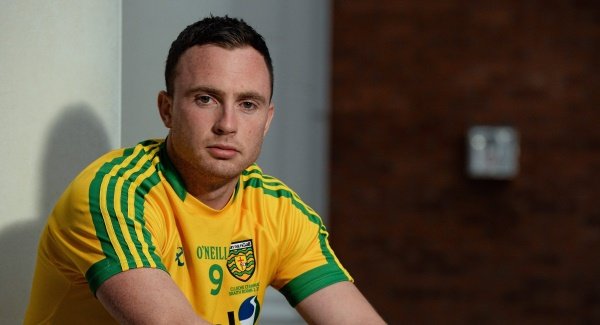Donegal star Martin McElhinney has said his team-mates have refused to listen to media criticism of their team – including that from former manager Jim McGuinness.
Many have been taken aback by the former manager’s open criticism of the tactics deployed in the defeat against Tyrone in the Ulster Final.
And McElhinney even stated that it was McGuinness who told them to ignore the pundits in the first place.
“Under Jim, his main thing was to say don’t worry about what the media say,” explained McEilhinney.
“They have to print lines, people just say things to get it out there. That’s one thing we’ve learned from the very first day.
“Newspapers don’t really refuse ink, so it doesn’t matter. People are going to say things to try and sell papers, but Jim’s still a massive Donegal man.
“I actually haven’t read Jim’s article, so I’ve only seen a couple of headlines here and there. We’ve trained twice since then, and no one has really mentioned it. The main aspect is that this is a tight group, a tight unit. If you took on board everything that people outside said, you wouldn’t get very far, because Donegal have gotten a lot of abuse this past while.
“We won’t really listen to what people are saying outside of our camp and our county, we just know that if we go into the game on Saturday week and our mind and our focus is in the right place, we can put in a performance to beat Cork.”
McElhinney say his team is now concentrating on putting things back in order against Cork at Croke Park.
“It’s good to get back over the defeat,” said McElhinney. “Look it’s a very hard one to take, but we’re delighted that we still have a chance on Saturday week.
“You probably remember the losses [in finals] more than you remember the victories. We’ve played in the last six Ulster finals and only won 50% of them. That’s a stat that you wouldn’t want.”
Speaking about where the team struggled on the weekend, McElhinney told Newstalk Sport highlighted that space was at a premium no matter where they turned, something that teams who compete in Ulster are more than used to at this stage.
“It was very hard to get space, even to break lines against Tyrone, particularly in the second half. I think we’ve become used to that because I know Donegal prob get a lot of negative press for being defensive, but we would class Tyrone as being just as defensive as us, they’re all at it.
“The last couple of years we’ve become accustomed to it. Every time you go out, it’s hard to play, so it is actually a bit refreshing to go out and play teams from other provinces that aren’t as defensive.
Even thought hey could have shut up shop when they were a few points to the good, McElhinney highlighted the dangers of that approach, saying “you still want to attack, you don’t want to rest on your laurels with a four point lead.
“Against Tyrone, you know they’re going to come out and hunt you, and in the second half they tightened up and made it a lot harder for us to get down into the scoring zones. We weren’t even trying to take the ball into contact, but you didn’t get much time on it.”
With Paddy McBrearty starved of possession, it was hard to find the scores in the second period that would get them over the line, a o problem that is not exclusive to Donegal. “For all the teams in Ulster, probably even some of the teams outside of Ulster, inside forwards are starved of possession,” said McElhinney. “That’s the way the game has gone, and we make no qualms about it.”
Turning his attention to the game against Cork, McElhinney noted that they will need to solve a few problems before they take to the field for the clash.
“It’s going to take an improved performance from last Sunday to beat them,” he said. “We would fear Cork, big time. If you look at the last six or seven years, they’ve always been around quarter-finals, semi-finals.
“I know they got beaten by Tipperary in the Munster Championship, but they’ve gotten straight into games since then. The most important game is the one straight after the first knockout. They’ve got a bit of confidence going now, and there’s nothing better than playing games week in, week out. It’s far better than three to four weeks of training.
“They’ll be on a high, riding on the crest of a wave coming into Croke park, fully convinced they can beat us. We know that we’ll have to be at 100% to beat them.”
Tags:







